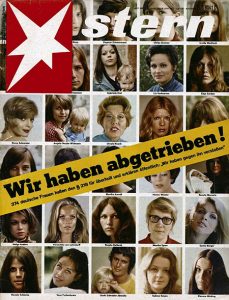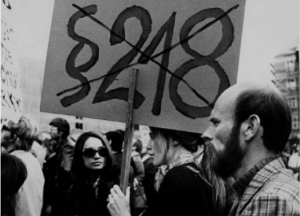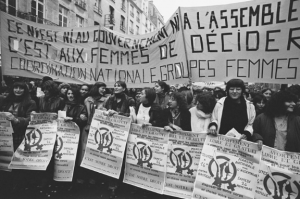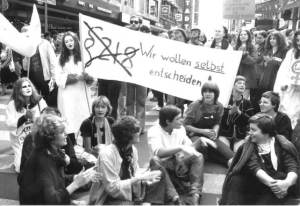Protest Against Paragraph 218 in 1971: “We Had an Abortion”
“Mein Bauch gehort mir!” // “My belly belongs to me!” – Slogan from 1971
Since 1871, Paragraph 218 and 219 of the newly implemented German Penal Code were abolishing any form and cause of abortion by a woman and any form of help given to an abortion by anybody else. These paragraphs were only slightly changed in the Weimar Republic abortions, when they were only considered legal for medical reasons in which the mother’s life was in danger. Any other social or ethical reason was deemed unlawful and was considered a punishable offense. During the time of the Nazi regime, abortions were only permissible in the case of terminating genetic defects, but were otherwise heavily punished for any other social reason. Often times women that chose to have abortions would resort to dangerous and secret practices for fear of being caught. Specifically, poor women struggled to find safe and affordable means to perform abortions and would often times die as a result of the dangerous procedure. Similar laws prohibited abortion and often also the public information about birth control in most other Western European countries until the 1970s. Not before 1975, Paragraph 218 and 219 of the Penal Code would be reformed in West Germany
Since the late 19th century first only individuals but soon also organizations like the Society for the Protection of Motherhood (Bund für Mutterschutz und Sexualreform, BfM), founded in 1905 by pacifist, women’s rights advocate, and sexual reformer Helene Stöcker (1869-1943), fought against the prohibition of abortion and demanded the legalization of birth control, equal and affordable access to it means and public information about its reliable and safe use. During the Weimar Republic (1919-1933) a growing mass movement on the left demanded a reform of Paragraph 218 and 219 of the Penal Code and a general sexual reform, but this movement was ended by the take-over of the political power by Nazi Party in January 1933.
In the early 1970s the new women’s movement started again to fight against the prohibition of abortion under the slogan “Mein Bauch gehort mir!” (My belly belongs to me!) In 1971, a group of women known as “Bred and Roses – Frauenaktion 70” (Brot und Rosen – Women’s Action 70) began taking action and fighting to be able to assert their right to an abortion. Initiated by the feminist and journalist Alice Schwarzer this group, mobilized women who had had illegal abortions to confess publicly to them. 374 women, many of them very well known, stated publicly that they had had illegally aborted pregnancies, making the issue pubic and forcing media and politics to have a conversation on the subject. The popular magazine Stem published their confessions with pictures June 6, 1971 under the headline “We had an Abortion.” This action followed the model of a similar article and list of women published in the French magazine le nouvel observateur in April 1971. Many of the women who publicly confessed that they had an illegal abortion faced criminal investigations. To support them within months, over 86,000 people declared their support of abortion reform in West Germany. These initiatives sparked a growing anti-abortion movement in both countries., West Germany and France. For its supporters criminalizing abortion was yet another way in which women were controlled by the West German patriarchy. They demanded the right of women to control their own bodies. Between 1970-1975, many different forms of action were developed to protest the criminalization of abortion, including mass street protests and demonstrations. Bread and Roses hosted a “Teach-In” at the Technical University in West Berlin in February 1974 attended by 2,000 people. In March 1974 an article appears in the liberal West German magazine Der Spiegel listing 329 doctors and nurses who have performed illegal abortions without financial compensation.
However, with fierce opposition from the Christian-conservative parties and the Protestant and Catholic Churches, the new women’s movement did at first not find enough support. The fact that abortion became legal on the other side of the Iron Curtain in East Germany in 1972, helped to get more political support for a reform in West Germany too. In 1974 the so-called Fristenregelung was introduced by a federal government controlled by the Social Democratic Party (SPD) and the liberal Free Democratic Party (FDP), which allowed pregnant women an abortion in the first three month of their pregnancy. But because of the continuing protest by conservatives and their legal appeal to the Bundesverfassungsgericht (the Constitutional Court of the Federal Republic of Germany) this regulation was changed to an Indikationsregelung in May 1976, which allowed abortion only in specific cases for economic, social and medical reasons and after a professional counselling of the pregnant woman. After the German unification in 1990, many feminists had hoped that the more progressive East German abortion law would be implemented in unified Germany, but this was not the case. The more conservative West Law prevailed.
While the 1971 protests carried out by lay and celebrity women did not completely get rid of Paragraph 218, it did open up an important legal and social discussion regarding the rights of women. At the time, these women were largely excluded from the policy process. Even today, women still struggle with finding adequate access to abortion resources in addition to not having enough representation in government with policies addressing women’s reproductive rights. The amount of women protesting during 197os for the female right to control the own body serves as a reminder of just how many women not only want, but need more access to safe abortions.
Olivia Porter, Global Studies, Class of 2020
Sources
Literature and Websites
- Wuerth, Andrea. “Re-Unification and Reproductive Rights: Abortion in the German Public Sphere, 1989-1990.” Working Paper, Center for European Studies, University of North Carolina, Chapel Hill, 1997. http://www.unc.edu/depts/eucenter/papers/wuerth_andrea.html (Accessed 21 April 2018)
- “We had Abortions”- Protest Against Paragraph 218 (1971) in Two Germanies (1961-1989), German History in Documents and Images, at http://germanhistorydocs.ghi-dc.org/sub_image.cfm?image_id=1592 (Accessed 21 April 2018)
- Stetson, Dorothy McBride. Abortion Politics, Women’s Movements, and the Democratic State: A Comparative Study of State Feminism, 111-121. Oxford: Oxford University Press, 2001.




